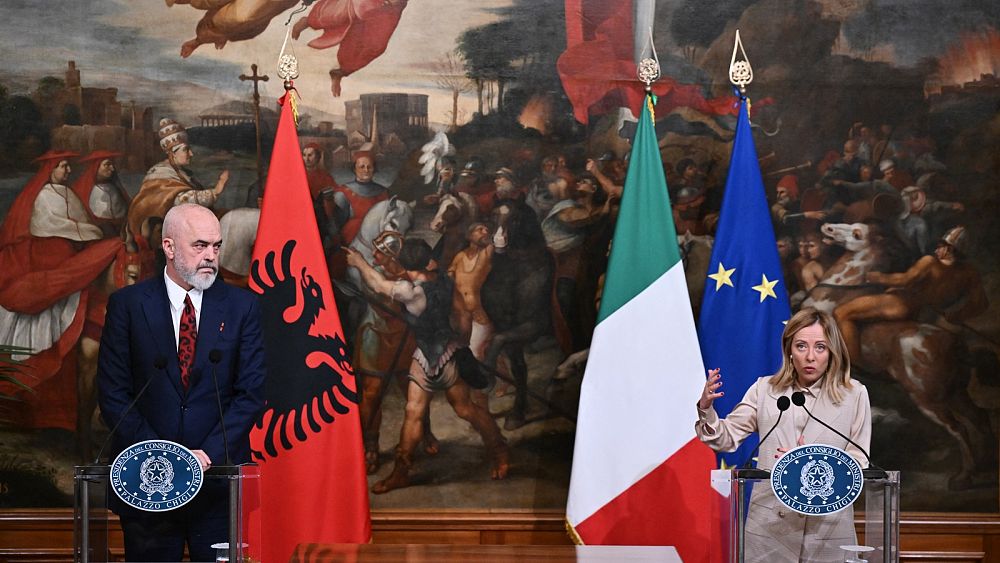The European Commission gave a lukewarm response to the migration agreement reached between Italy and Albania, only warning that they must comply with EU and international law.
“We contacted the Italian authorities because we needed to see the details. “We asked for detailed information about this kind of agreement,” claimed a spokesperson for the European Commission this Tuesday afternoon.
The agreement, the first for an EU Member State, is announced on Monday by the Prime Minister of Italy, Giorgia Meloni, and the Prime Minister of Albania, Edi Rama, in a bilateral meeting in Rome.
Under the unexpected agreement, Italy will build two reception centers in the Balkan country. There they will process the asylum applications of migrants rescued in the Mediterranean Sea by Italian authorities who will be dropped off in the Albanian coastal town of Shëngjin. The centers will have the capacity to accommodate up to 3,000 migrants at a time, Meloni explained, with the goal of processing 36,000 applications per year. Pregnant women, children and vulnerable people will not be involved.
The costs and maintenance of the infrastructure will be covered by Rome, while Tirana agreed to provide external security and surveillance services. The launch is scheduled for spring 2024. Both centers will be governed by Italian jurisdiction, a matter that raises concerns regarding the extraterritorial application of Italian and EU law in non-EU countries.27.
“Member States are not prohibited from taking action under national law to allow asylum applications to be submitted by persons from third countries,” said a Commission spokesperson, “but this must be done without prejudice to the full application” of EU asylum rules.
The question of who will handle the deportation of rejected applicants remains unclear. Initial reports stated that the task would be carried out by Albanian authorities, but Prime Minister Rama later stated that the task would be Italy’s responsibility. The agreement was reached at a political level and still needs to be “followed by all applicable regulatory provisions,” Meloni said.
The news immediately drew comparisons to the controversial migration agreement between the UK and Rwanda, which states that asylum seekers will be transferred from the UK to the African country while their applications are examined. The deal remains blocked by British courts and no deportations have taken place.
Ylva Johansson, European Commissioner for Home Affairs, states the year in the past that the UK plan “is not a humane and dignified migration policy”, while Austria recently declared it to be a humane and dignified migration policy open to explore Rwanda-style agreements with non-EU countries.
When asked about the comparison, a Commission spokesperson denied any similarities, as the Italian-Albanian plan would apply to those who had not yet reached Italian shores. “We have to understand the Italian case first before discussing it in detail. From the first information we see, this is not the same case. But, once again, we need detailed information,” said the spokesperson.
The news from Rome comes as the bloc’s immigration reforms enter their final stages. The reforms include faster “border procedures” to examine asylum requests from asylum applicants from countries with low recognition rates, such as Tunisia, Egypt, Morocco and Pakistan. This procedure should last a maximum of 12 weeks.
In line with those reforms, member states are working to strengthen the so-called “external dimension” of migration, which is code language for partnerships with non-EU countries to prevent migrant boats from leaving. Italy, which this year saw the irregular arrival of more than 145,000 migrants, has been one of the strongest defenders of the new policy.
“I believe (the agreement) can become a model of cooperation between EU and non-EU countries in managing migration flows,” Meloni believes. Il Messaggero in an interview, in which he stated that he had informed the Commission in advance and had not received any negative response. “I believe this agreement is characterized by a bold European spirit,” he defended.
However, the most tangible result from the external dimension – the memorandum of understanding with Tunisia – has been achieved seenaffected by disagreements, setbacks and controversial gains since his signing in mid-July.

“Web specialist. Incurable twitteraholic. Explorer. Organizer. Internet nerd. Avid student.”






